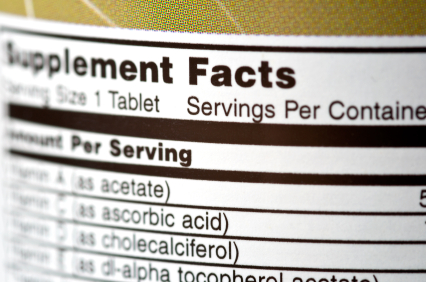The keys to good health and successful athletic performance are a carefully designed, healthful, and nutritionally balanced diet and well-developed program which promotes a "food-first" philosophy, says a helpful new position statement1 on evaluating dietary supplements from the National Athletic Trainers' Association (NATA).
Recommendations
The NATA warns that, in the quest to improve performance, many athletes may receive advice and feel pressure from many well-meaning supports and advocates, but are, as a result, vulnerable to misinformation and risk in terms of the safety, legality, and efficacy of dietary supplements.
When an athlete is considering use of a dietary supplement, he or she needs to remember that there is no "quick fix" or shortcut to success, says the NATA, and ask several questions: Is it safe, is it legal, and will it work?

1. Adopt a Food-First Approach. Before considering adding a supplement to the athlete's diet, consider proper nutrition and changes in the athlete's diet first.
- Whole foods should be emphasized over dietary supplements because:
- Whole foods have greater nutritional content than their pill- or powder-form counterparts
- In most cases, the vitamins and minerals in foods are better absorbed than those found in supplements
- Ingredients added to conventional foods are required to appear on the Federal Drug Administration (FDA) generally-recognized-as-safe (GRAS; proven safe for human consumption) list, and new ingredients must be FDA approved before marketing; dietary supplments do not require FDA approval as long as all ingredients are not considered new and fit the criteria of the Dietary Supplement Health and Education Act (DSHEA).
- Athletes should realize that nutrient overconsumption is possible when using supplements or highly fortified foods, which was the reason safe upper limits were added to dietary recommended intakes, and that, during intense training, they may forget to prioritize a healthful diet over dietary supplments to support performance.
- An athletic trainer can help athletes by becoming knowledgeable in the area of performance nutrition and aware of reliable (eg. peer-reviewed) sources for information, such as from the International Olympic Committee Medical Commission's 2010 consensus statement on sports nutrition, group-compiled and peer-reviewed fact sheets from the Sports, Cardiovascular, and Wellness Nutrition (SCAN) dietary practice group of the American Dietetic Association (ADA)(now recognized as the Academy of Nutrition and Dietetics) [SCAN has developed a specialty-practice credential for registered dietitians called the Certified Specialist in Sports Dietetics (CSSD)], and resources provided by the Collegiate and Professional Sports Dietitians Association (CPSDA), which ATs may join as associate members (http://www.sportsrd.org).
- Athletic trainers should establish a support team that includes a registered dietitian or or other health care professional with expertise in nutrition.
- Athletes and ATs need to understand the level of regulation (or lack of regulation) governing the supplement industry at the international, federal, state, and individual sport-participation levels, that dietary supplements are not well regulated and may contain banned substances. [See full Position Statement for resources]
- Athletes and ATs should be aware that dietary supplement lables do not require third-party verification; purity (truth in labeling), and noncontamination cannot be assumed.
- Athletic trainers should be prepared to educate athletes that dietary supplements may contain banned substances.
- Labeling requirements for dietary supplements are similar to those of food products. Because ATs cannot be expected to test for supplement purity, they, athletes, and their parents need to be aware of resources to help identify companies or products known to have a problem with labeling, adulteration, or contamination.
- Because federal regulations do not require supplement manufacturers to provide evidence of safety, ATs should be aware of resources to identify products associated with adverse effects.
- Athletes need to be educated about the lack of regulation, because they are ultimately responsible for the health and eligibility risks resulting from use.
- Dietary supplement manufacturers are not required to provide evidence of efficacy. ATs therefore need to be aware of resources to identify supplements (or individual components), the quantity of active ingedients, and the mixture of active and inactive ingredients supported by peer-reviewed scientific evidence relating to product efficacy.
1. Buell JL, Franks R, Ransone J, Powers ME, Laquale KM, Carlson-Philips A. National Athletic Trainers' Association Position Statement: Evaluation of Dietary Supplements for Performance Nutrition. J Athl Tr 2013;48(1):124-136.
Posted February 4, 2013









